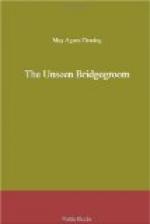No-one was visible—not even a stray “guardian of the night,” treading his solitary round—and Mollie, after one glance at the starry concave, was about to drop the curtain and retire, when a tall, dark figure came fluttering up the street, pausing before the Walraven mansion, and gazing up earnestly at its palatial front.
Mollie recognized that towering form instantly, and, impulsively opening the sash, she leaned forward and called:
“Miriam!”
The woman heard her, responded, and advanced.
Mollie leaned further out.
“Have you come to see me?”
“I should like to see you. I heard you had returned, and came here, though I did not expect to meet you at this hour.”
“Wait one moment,” said Mollie; “I will go down and let you in.”
She closed the window and flew down-stairs, opened the house door softly, and beckoned.
Miriam entered. Ten minutes later, and they were safely closeted in the young lady’s cozy room.
“Sit down, Aunt Miriam, and take off your shawl. You look cold and wretched and half starved.”
The woman turned her hollow eyes mournfully upon her. They were indeed a contrast—the bright vision in the rose silk dress, the floating amber curls, the milky pearls, the foamy lace, and the weird woman in the wretched rags, with sunken cheeks and hollow, spectral eyes.
“I am cold and wretched and half starved,” she said, in a harsh voice—“a miserable, homeless outcast, forsaken of God and man. My bed is a bundle of filthy straw, my food a crust or a bone, my garments rags from the gutters. And yet I accept my fate, since you are rich and well and happy.”
“My poor, poor Miriam! Let me go and get you something to eat, and a glass of wine to refresh you. It is dreadful to see any human being so destitute.”
She started impetuously up, but Miriam stretched forth her hand to detain her, her fierce eyes flaming up.
“Not half so dreadful, Mollie Dane, as the eating the bread or drinking the cup of Carl Walraven! No; I told him before, and I tell you now, I would die in a kennel, like a stray dog, before I would accept help from him.”
“Miriam!”
Miriam made an impatient gesture.
“Don’t let us talk about me. Let us talk about yourself. It is my first chance since you came here. You are well and happy, are you not? You look both.”
“I am well and I am happy; that is, as happy as I can be, shrouded in mystery. Miriam, I have been thinking about myself. I have learned to think, of late, and I would give a year of my life to know who I am.”
“What do you want to know?” Miriam asked, gloomily.
“Who I am; what my name may be; who were my parents—everything that I ought to know.”
“Why do you speak to me about it?”
“Because you know, I am certain; because you can tell me, if you will. Tell me, Miriam—tell me!”




